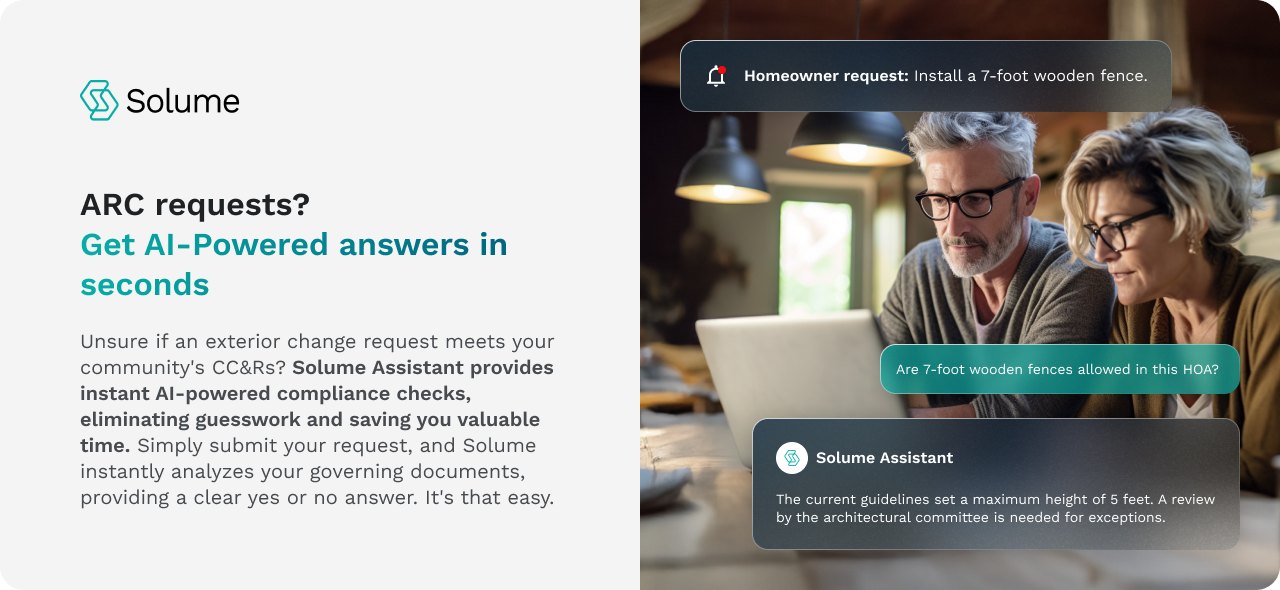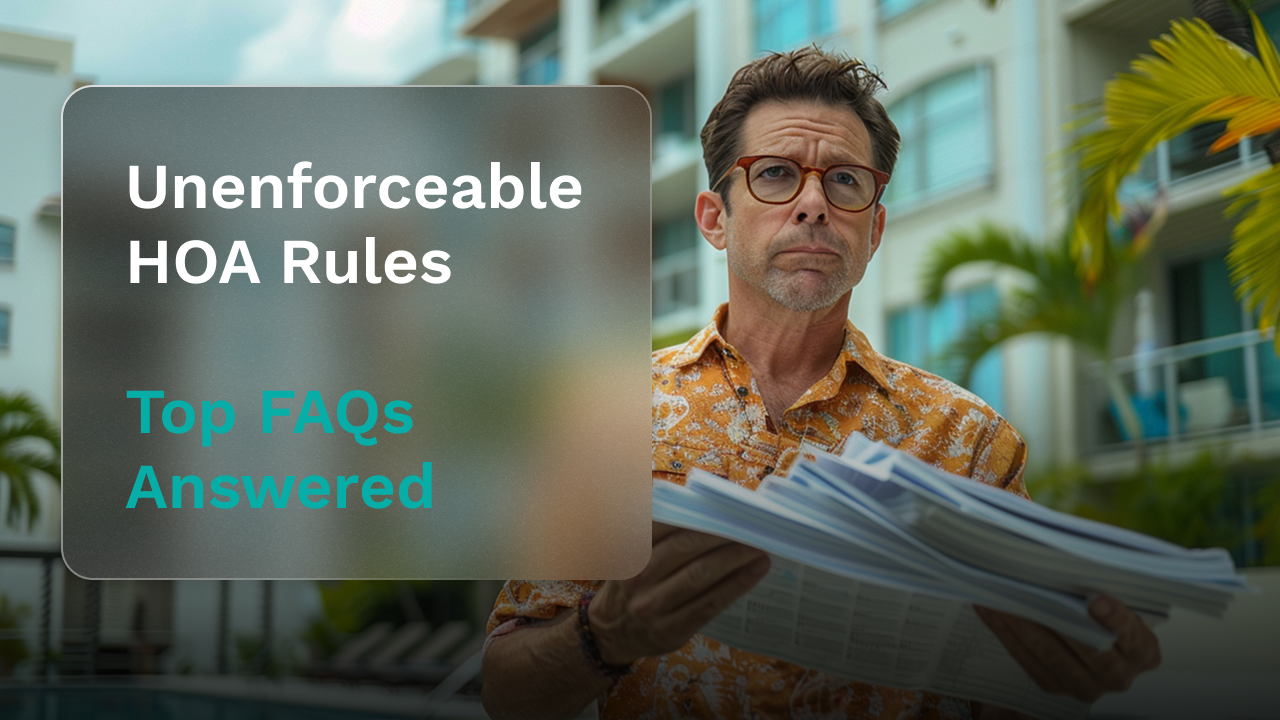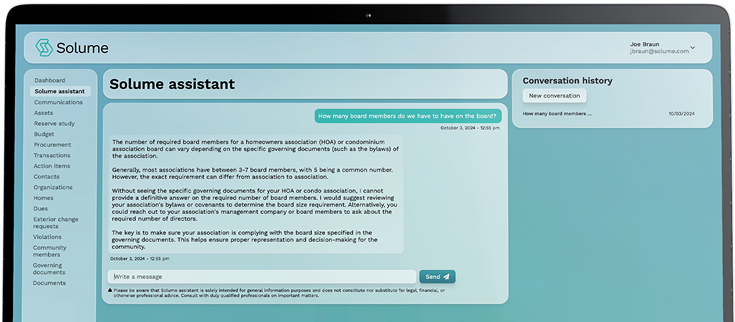You agreed to follow the rules when you bought your home—but what happens when your HOA enforces rules that were never properly adopted? Or worse, rules that conflict with state or federal law? Many homeowners feel blindsided by surprise violations, confusing fines, or inconsistent enforcement. The truth is, some HOA rules are enforceable—and some just aren’t.
In this guide, we’ll break down the difference between legitimate authority and overreach. We’ll also show you how Solume helps boards and residents alike stay on the same page, cut down on legal risk, and lead with transparency.
Legal + Enforcement Reality
1. Can an HOA really enforce a rule that isn’t in the original governing documents?
The answer is both yes and no. Yes, the HOA can enforce a rule that isn’t in the original governing documents if the rule was passed through a formal amendment or vote. No, it can’t enforce rules if they have not formally adopted them.
The rules must be officially adopted rules from the CC&Rs or bylaws. However, boards sometimes confuse a guideline (or memo) with an enforceable rule. For example, if you wake up with a parking violation from your HOA and think to yourself, “I didn’t even know we couldn’t park on the street,” check your CC&Rs and bylaws to determine if the rule was officially adopted (voted on and recorded).
2. What happens if a homeowner challenges an unenforceable rule in court?
If it comes to taking the HOA to court, you should have a convincing argument and believe you have a solid chance at winning. Courts often side with clear legal precedent over board opinion (see the above answer). Homeowners typically win when rules conflict with state or federal laws or due process is not followed. Another thing to consider is whether the rules are enforced equally for everyone. Even if a rule is enforceable, if it is unequally enforced, a homeowner has a strong likelihood of winning in court. However, the cost and stress often prevent homeowners from escalating it to court. Sometimes just a letter from an attorney gets them off your back.
Solume helps communities stay organized enough to avoid these messes in the first place. When every rule has a clear digital paper trail and time-stamped history, it’s a lot harder for either side to play games. The board can lean back on accurate documentation when accused of unfair rule enforcement.
3. Is it true that federal and state laws override HOA rules? What are some examples?
Yes, higher laws beat HOA rules nearly every time. ADA, FHA, and state laws trump HOA regulations. For example, federal law (Over-The-Air Reception Devices Rule (OTARD Rule)) means the HOA (or Condo Association) can’t prevent or unreasonably prevent a homeowner from owning a satellite dish or antenna. If a homeowner has exclusive use of balconies, patios, or backyards (in single-family homes), you can place a dish in it.
There are other rules that vary from state to state that pertain to solar panels, hanging clothes out to dry, flags, etc. that HOAs are limited in what and how they can restrict.
4. How often do HOAs try to enforce rules they legally can’t?
In our experience, many HOAs don’t realize the limits of their own authority. HOAs probably penalize residents more often than you realize. Many rules are enforced until someone pushes back or questions them, especially if the board knows it’s not a legitimate rule. With Solume, every rule entered into the system is tied back to governing documents. Boards can’t just enforce “rules by rumor,” and residents can check the source for themselves.

Board vs. Owner Dynamics
5. Why does it feel like my HOA is always looking for reasons to fine people?
The primary reason owners and residents in an HOA feel targeted by what appears to be unreasonable fines is that there is a financial incentive. Often, however, it is the property management company that pockets the money - not the HOA. Solume doesn’t monetize violations. Period. Unlike some property management companies that profit off of enforcement, Solume is just a tool built for HOA transparency, not to turn fines into revenue.
So while it feels like the HOA is “after you,” it very likely could be the property management company. It would be like if the police earned a commission on every ticket they wrote. You can be certain they would be looking for any excuse to write a ticket for you.
For a different reason, HOA boards do have a legal duty to enforce the rules fairly. And homeowners and residents have a legal obligation to follow the rules (that were signed when you bought the house).
6. Why do some HOA boards enforce rules inconsistently or unfairly?
Boards have power struggles, personal bias, and a lack of training. Also, depending on the size of the community, the board member or property manager responsible for tracking violations might not check some areas as frequently as other areas.
Volunteers may not understand due process or equal enforcement. This, of course, leads to legal risk and a healthy skepticism within the community.
7. What should a homeowner do if they feel a rule is being selectively enforced?
First, the most effective way to challenge a violation is to document examples of inconsistent enforcement. If you see or hear of others not being fined for a violation, document every example you can find.
Second, request clarification and justification from the board in writing.
Third, check your governing documents and state laws to see if the rule even applies.
Fourth, notify the board in writing why their violation should be tossed out.
In communities using Solume, every rule, violation, and appeal is tracked with timestamps, photos, and comments—so if you’re being singled out, the history speaks for itself.
8. Have we ever seen a board back down from enforcing a rule after pushback?
Contrary to what you might believe, when a homeowner presents legal precedent or even social media attention, boards sometimes don’t want the PR headache.

Comparing States & Protections
9. Which states offer the most protection for homeowners against overreaching HOAs?
California has one of the most detailed HOA civil codes in the country. It’s not perfect, but if you’re a homeowner there, you’ve got more legal guardrails than most.
Florida started tightening the screws after the Surfside condo collapse. There’s more oversight now—especially around reserves and transparency—but enforcement is still a work in progress.
Texas has made it harder for HOAs to overstep when it comes to things like native landscaping, religious displays, or flying the American flag. They’ve drawn a clearer line around personal property rights.
And in some states, there’s actually a homeowners advocate office or a built-in dispute resolution process. It’s not everywhere, but where it exists, it gives homeowners a way to push back without immediately hiring a lawyer.
10. How do HOA laws differ between self-managed and professionally managed communities?
Professional managers should err on the side of legal process (because their license can be revoked if they mishandle a situation). However, in our experience, self-managed HOAs tend to be more understanding, much like real neighbors who are doing their best to serve their community without overstepping. But the laws for governing the community still apply regardless of who manages.
Of course, as stated above, everyone has their own biases and reasons for enforcing rules unfairly. Solume gives self-managed communities the tools to operate like a professional office—without losing the humanity of neighbors just trying to get it right.Transparency is baked into the system, so even small boards can stay on the right side of the law.
11. Do any recent state laws make previously enforceable rules now void?
Laws are frequently changed or updated in states. For example, solar access laws, EV charger rights, and rental restrictions are among many laws recently rewritten for HOAs. Florida’s Senate Bill 4-D and amendment SB154 were written after the Surfside condo collapse. This pertains to strict funding for structural reserve accounts.
Solume’s AI assistant helps boards stay on top of changing state laws so the rules they enforce don’t become a liability overnight.
Emotional & Social Impact
12. What’s the emotional toll on homeowners dealing with unfair or unclear HOA rules?
Homeowners report stress, frustration, and anxiety over constant threats or fines from their HOA. Nobody wants to feel “policed” in his or her own home. Unequal violation causes people to feel targeted.
Any digging around Reddit or social media will make you realize how much people hate feeling like their HOA is looking for any opportunity to send them a violation notice.
13. Have we ever seen a community divided over an HOA rule?
Rules over fences, pets, or short-term rentals cause battles within a community. Some people want fences so they can let their pets out; other people hate pets entirely and want the community to feel open without fences. Some people think rentals bring down property values; other people don’t see how renters are any less good residents.
14. What lessons have we learned from seeing rules challenged (or not challenged) over time?
Unfortunately, silence equals consent. Boards will often push as far as residents let them.Most people don’t realize they can change rules until it’s too late. For example, a brand-new “starter-home community” has a lot of young families. A community rule states you can’t have any vehicles parked on the driveway or street overnight. Many young families might not think twice about this rule until all the kids start turning 16 and suddenly every house has multiple cars. Should the HOA update the rules to reflect the community dynamics?
Stats & Data-Driven Questions
15. How many homeowners live under an HOA in the U.S., and how many actually understand their rights?
Approximately 74-75 million Americans live in HOA communities. Some estimate that there are between 358,000 and 370,000 active community associations in the US alone.
Most people don’t know what their HOA rules state until they get a violation from their Board. Fewer understand their rights. Solume Assistant is an AI tool that allows for communities to know exactly what their community rules are and how state laws apply to them.
16. What’s the average cost of defending yourself against an HOA enforcement action?
Legal fees can range from $2k to $20k depending on how far the problem escalates. Most cases settle out of court, but not before stress and costs mount. Is it really worth spending $6,000 to fight a $50 fine? For some, the principle is worth the expense.
17. How often are HOA fines overturned in court or through mediation?
As stated above, success often depends on documentation and clarity of rule authority. Many fines are reduced or waived when challenged. Some states have mandatory maximum fines for a single infraction and maximum total fines.



